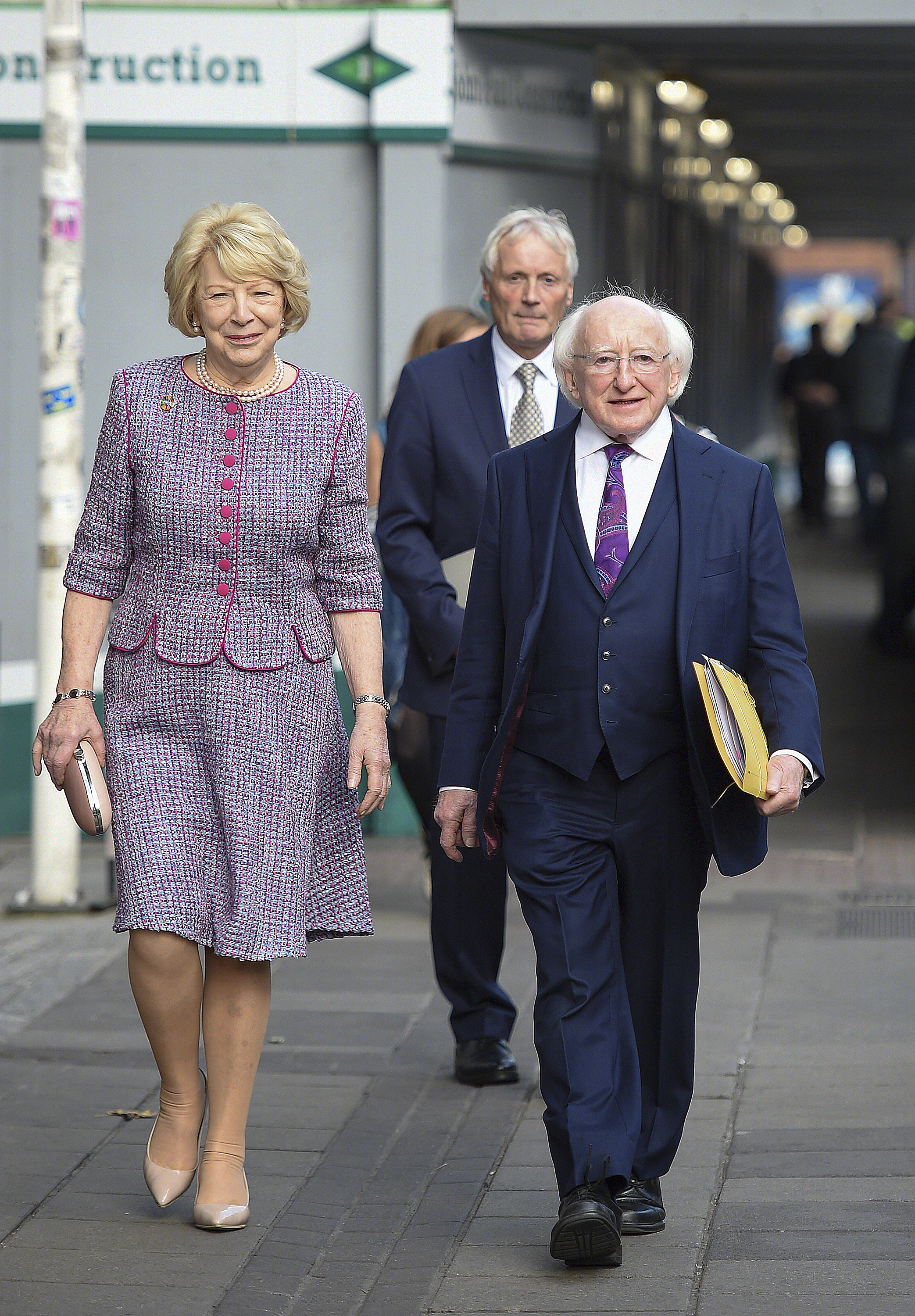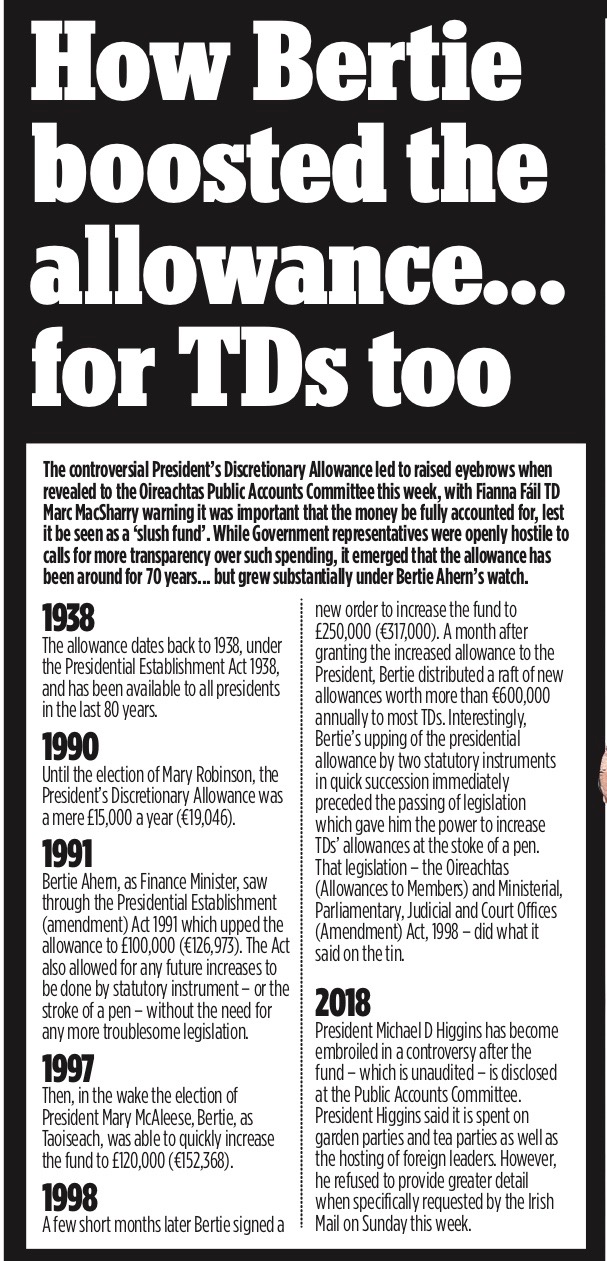By: Michael O’Farrell
Investigations Editor
PRESIDENT Michael D Higgins was at the centre of a growing transparency row last night over his refusal to clarify if he had ever used his mystery €317,000 Áras allowance to top up salaries for his advisers.
His campaign rivals rounded on him for not answering simple questions from this newspaper, and called on the President to release more details of the funding.
Eyebrows were raised when the Public Accounts Committee was told there was zero oversight on the fund, and it is not even available for audit by the Comptroller and Auditor General.
A spokesman for One Mr Higgins refused to clarify to the Irish Mail on Sunday whether he used the allowance to pay salaries or tops-up to advisers, or to pay for personal gifts. This led all five of the other Áras candidates to question his commitment to transparency, which has become the first major theme in this year’s campaign.
President Higgins also declined to say if any part of the allowance was used to fund the salary of his executive assistant, Kevin McCarthy, despite previously finding money for his salary by switching funds around in his budget.

Picture by å© Michael Chester.
Mr McCarthy became a close confidant after he offered to drive Mr Higgins for free during the gruelling 2011 presidential election campaign. The President then appointed him to his staff on the day of his inauguration, creating the position of executive assistant especially for him.
That caused some administrative difficulty because President Higgins had already filled his allocation of advisers, and there was no specific funding available from the wages element of his budget to pay Mr McCarthy’s €49,000 salary.
The matter was only resolved when the President’s office proposed to the Department of Public Expenditure that ‘non-pay’ funds could be diverted from elsewhere in the Áras budget.
An internal email to the department’s Secretary General Robert Watt read: ‘The President’s office is satisfied that the extra costs could be met from within the existing overall allocation for the President’s vote, through the switching of funds from non-pay.’
The 2012 correspondence – released under the Freedom of Information Act – confirms that the department approved the creation of Mr McCarthy’s position even though it ‘would entail an increase in the cohort of advisers’.
The department also approved the payment of wages to a number of presidential advisers that was in excess of the €80,000 pay cap put in place by the Government.
That allowed special adviser Mary van Lieshout to be paid €103,000 – €20,000 in excess of the cap.
Miss van Lieshout later resigned unexpectedly, half way through her contract, amid reports of tensions between her and Mr McCarthy, though she denied such problems.
The MOS asked President Higgins’s campaign spokesman if any top-ups to advisers had been funded directly or indirectly from the €317,000 allowance.
We also asked if any of the salary paid to Mr McCarthy had been paid directly or indirectly from the allowance.
We asked for a breakdown of the expenditure on an annual basis. The spokesman did not answer these questions.
Instead, he repeated a previous statement: ‘The allowance currently supports hospitality for the 20,000 people that visit Áras an Uachtaráin each year, state dinners for visiting heads of state, and the hundreds of events hosted by the President at Áras an Uachtaráin each year.’
At his election campaign launch on Wednesday, President Higgins said the allowance could be withdrawn by the Government, ‘if you didn’t want to serve a cup of tea to those elderly citizens, if you didn’t want to receive those citizens who were in the Magdalene Laundries or those associated with the Irish language movement and indeed all the different voluntary groups’.
He said that if re-elected, he would have ‘no difficulty in constructing a statement as part of the formal annual report to the Comptroller and Auditor General in regard to this expenditure, in a way that complies with the Constitution while respecting the independence of the office’.
But in response to this failure to provide details, presidential candidate businessman Peter Casey told the MOS yesterday: ‘The President is saying that he will be transparent going forward but that’s not good enough. I want to know what he is spending the money on now and if it is used to buy personal gifts and salary top-ups.
‘He should tell us before the election what he’s spending his money on, and it concerns me that he is refusing to answer these questions. If the President has nothing to hide, what’s the problem?’ A spokesman for Seán Gallagher said that he was unaware of the existence of this allowance and learned of it from the meeting of the Public Accounts Committee earlier this week.
He said: ‘As with all public expenditure, it should be fully audited and Seán Gallagher was surprised to learn that, in this instance, the allowance was not audited. The office of the President should lead by example in all areas, including in the area of transparency with regards to the use of public funds.’
Sinn Féin’s Liadh Ní Riada said: ‘There is no reason that spending from such an account would be unvouched. All expenses should be accounted for and spending should be audited. The President has been in office seven years so it is surprising that he is only now suggesting he would deal with this issue if re-elected.
‘Citizens deserve and expect transparency in how their money is spent and this is something I would ensure if elected.’ Senator Joan Freeman told the MOS: ‘In my view, the allowance given to the office of the President should be fully accounted for and itemised. As I have said, on previous occasions, this transparency should have happened long ago.
‘I hope that the timing of this scrutiny is for the sake of reassuring the public how their monies are being spent and not motivated by the presidential election.’ Gavin Duffy said: ‘The €317,000 allowance is funded by the taxpayer. There should be a full breakdown as to what the money was spent on. It is not enough in this day and age to simply provide an approximate spend under some headings. That is why it is very important that Áras an Uachtaráin is subject to internal audit.
‘Ultimately we need the Presidency be subject to FOI.’ President Higgins will now likely come under pressure to confirm one way or another whether the allowance played any role in the payment of advisers, especially since the PAC heard this week how the fund, worth €2.2m since President Higgins took office, went unaudited until this year.
The shocking omission emerged when Martin Fraser, accounting officer for the office of the President and the most senior civil servant in the country, was questioned by PAC members on Tuesday. He appointed an audit committee for the allowance in 2014 but it failed to meet due to the illness and later death of its chairman in January last year.
A year-long gap ensued until a new chairman was appointed, and the committee only commenced its work this year.
Postscript.
Following the publication of this article President Higgins was forced to address the issue of this allowance when questioned by reporters on the campaign trail. He denied that his allowance had been used to top up or cover any part of the salaries of his advisors. However, he continues to refuse to release details of his he spent the allowance – until after the election.

